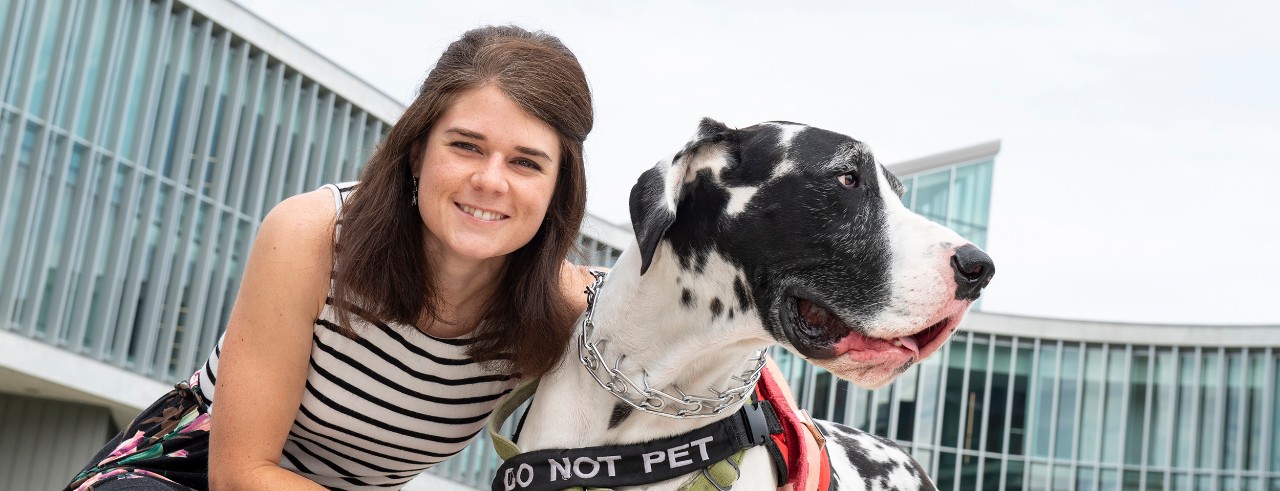
UC CAHS student hopes her experience as a patient helps her as a researcher
Her experience with Friedreich's ataxia provides a unique perspective for her research
When Caroline Spencer was diagnosed with Friedreich’s ataxia (FA) just before her 24th birthday, she unfortunately knew what was ahead for her. Spencer, now 31 and in her fourth year as a doctoral student in the Department of Communication Sciences and Disorders (CSD) at the University of Cincinnati (UC) College of Allied Health Sciences, was familiar with FA from her studies in neuroscience as a UC undergrad and while getting her master’s degree in speech pathology from Purdue University.
“It was pretty tough to take because, even though I knew something was wrong and the answers I’d been getting weren’t right, I didn’t want FA to be the answer,” she says.
FA is a genetic condition that affects the nervous system and causes movement problems. People with this condition develop impaired muscle coordination, gradual loss of strength and sensation in the arms and legs and impaired speech, hearing and vision.
Spencer says it was when she was around the age of 20 that she first went to the doctor because of problems she was having with her balance.
“I was never very athletic or coordinated, and it took me a long time to learn to ride a bike,” she says of what she now sees as her earliest symptoms. “I have two brothers and they don’t have it, and neither of my parents are symptomatic, but they are both carriers, so I’m the lucky one who got both recessive traits.”
Spencer says the last part of that sentence with a smile and quick laugh, something she does a lot during a conversation. That’s a bit unexpected coming from someone who knows that her mobility, which is already challenged, is most likely only going to become more limited in the coming years. She says she doesn’t have any other choice but to maintain a positive attitude.
“Psychological and emotional states have a big impact my physical states,” Spencer says. “If I’m sad or worried or tired or stressed or anxious, that all then has a domino effect. I’ll be more fatigued and less coordinated. For anyone, psychological or emotional factors influence their physical factors, but I think it’s even more obvious for me. That’s not to say I haven’t struggled with those things, too.”
Spencer speaks haltingly and it takes some effort to get her words out. Her steps are slow but determined, and she gets around with the help of her service dog, Clark, a 4-year-old white and black Great Dane who she has had for three years.
“For three or four years after I was diagnosed I didn’t use any assistive device at all. Whether or not it was a good choice, I don’t know,” says Spencer.
Her fear was that once she started using an assistive device, there would be no turning back. She finally got to the point where she needed to use a walker, something that only lasted about four or five months. That’s when she got Clark. The two of them are familiar figures in the hallways of the Health Sciences, Medical Sciences and CARE/Crawley buildings. Spencer is still able to drive and Clark hops into the backseat of her SUV whenever it’s time to go somewhere.
Spencer is currently working on a National Institutes of Health fellowship grant to fund her dissertation and training in neuroimaging analysis, using data related to speech language pathology research conducted by Suzanne Boyce, PhD, professor in CSD and Spencer’s advisor. Spencer says the outcome of this project will provide further knowledge about the interaction between phonological and motor networks for speech production in children who fail to acquire all the sounds of their language.
“Hopefully, my experience of being a patient will help my research be better, more focused and meaningful,” she says. “Hopefully I can help identify the problems that really need to be focused on. I really enjoy being the bridge between talking to patients and talking to other researchers so I feel like sometimes I can translate that gap a little bit.”
Featured photo: Colleen Kelley/UC Creative Services
Additional Contacts
Related Stories
Growing heart failure epidemic calls for prioritizing primary...
May 5, 2025
A rapidly growing heart failure epidemic calls for prioritizing primary prevention, according to a new scientific statement from the American Heart Association published in Circulation in April. The statement reviews the current evidence for predicting heart failure risk and offers risk-based strategies for heart failure prevention.
Leveling up
May 2, 2025
Meet four College of Allied Health Sciences students who are advancing their education following graduation this May.
Machine learning brings new insights to cell’s role in...
April 30, 2025
Researchers led by the University of Cincinnati’s Anna Kruyer and the University of Houston’s Demetrio Labate have published research in the journal Science Advances applying object recognition technology to track changes in brain cell structure and provide new insights into how the brain responds to heroin use, withdrawal and relapse.
